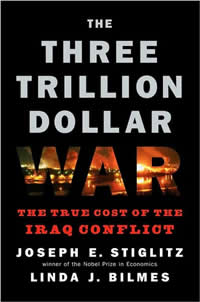Book Notes
 Joseph Stiglitz and Linda Bilmes, The Three Trillion Dollar War; The True Cost of the Iraq Conflict (New York: W.W. Norton, 2008), 311pp.
Joseph Stiglitz and Linda Bilmes, The Three Trillion Dollar War; The True Cost of the Iraq Conflict (New York: W.W. Norton, 2008), 311pp.
The Bush administration told taxpayers that the Iraq war would cost about $50 billion dollars and be paid for by that country's oil revenues. Joseph Stiglitz, chairman of President Clinton's Council of Economic Advisers and a 2001 recipient of the Nobel Prize in Economics, and Harvard professor Linda Bilmes, estimate that the real cost of the war is three trillion dollars. And that's almost certainly a "gross underestimate" due to the conservative methods and estimates used in their calculations. Even worse, because of the breathtaking incompetence and deliberate secrecy of the DOD accounting procedures, no one can know the true cost of the war.
If you divide three trillion dollars by the number of households in the United States, you get $25,000 per household. That's your share for the Iraq war. But don't worry. You won't have to pay because because the war has been funded entirely by borrowing money. We'll let others pay our debts. Plus, the economic costs of the war are off the books, above and beyond the DOD's bloated budget. The richest country in the world, the authors observe, hasn't been able or willing to live within its means. But there's a "simple message of this book, one that needs to be repeated over and over again: there is no free lunch, and no free wars. In one way or another, we will pay these bills."
We're already paying heavy "opportunity costs." The human consequences of the war have been as disastrous as the economic costs. After five years, the most powerful country in the world, a country that spends more on its military than all other countries combined, hasn't been able to subdue a country with only 10 percent of its size and 1 percent of its GDP. Iraq's middle class has been ravaged. A majority of its children don't attend school. The country now has only half the number of doctors as before the war. As of September 2007, over 4 million Iraqis (one of every seven) had been displaced from their homes. Oil has soared from $25 a barrel to $100 a barrel since the war began, making the oil companies (along with defense contractors) one of the few beneficiaries of war. Over 751,000 veterans of Iraq and Afghanistan who have already been discharged from the military will need medical care and benefits the rest of their lives (1.6 million men and women have been deployed to Iraq and Afghanistan).
Yes, it would be a disaster for us to leave Iraq. But the longer we wait, the more disastrous these consequences will be for the US, for Iraq, and for the world. With no exit plan in sight, and Bush intent upon running out the clock in order to pass the problem to the next president, it looks like we'll delay that debacle just as we've pushed the economic costs into the future. Given these economic and human costs, it's unconscionable that any administration can act with such impunity.


